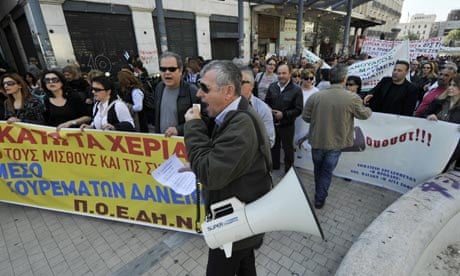Greece got a new finance minister on Wednesday, days after the crisis-hit country's interim prime minister Lucas Papademos said he was convinced Athens was "more than halfway along the path" to economic growth and recovery.
Filippos Sachinidis was promoted from deputy minister after Evangelos Venizelos stepped down to take over the helm of the socialist Pasok party ahead of parliamentary elections which could come as early as next month.
Sachinidis is a moderniser and former banker widely seen as a pair of safe hands as the debt-stricken nation navigates its worst crisis in modern times.
His appointment was welcomed by both Pasok and the centre right New Democracy, the two parties power-sharing under Papademos, himself a former vice-president of the European Central Bank.
The change of guard came as the country that triggered Europe's debt crisis in December 2009 raced against the clock to implement reforms demanded by the EU, ECB and International Monetary Fund in exchange for €130bn in extra aid to prop up its moribund economy.
A first instalment of rescue funds worth €7.5bn was disbursed to Athens this week. Receipt of the money, which included €1.6bn from the IMF, followed this month's unexpectedly successful bond swap between Greece, banks and other private holders of its debt. A further €35bn is lined up to be injected into the country's cash-starved banking system – widely seen as a vital step to reinvigorate an economy mired in austerity-driven recession.
But with fresh elections also looming the British trained economist Sachinidis is under immense pressure to ensure that promised reforms are implemented in the countdown to the poll. At his first cabinet meeting as finance minister on Thursday he will be asked to expand on how Greece can expedite the long-overdue process of opening up professions.
Failure to liberalise the "closed shops" has been blamed for the country's economic insularity and notoriously low levels of competitiveness. In a sign of resistance lawyers in the Greek capital went on strike.
Italy's technocratic prime minister Mario Monti faces a similar challenge after the country's biggest union, CGIL, called for a general strike in protest at plans to relax workers' protection against being fired. Other unions had backed the move but CGIL warned it would lead to an avalanche of job losses. Monti's government won a confidence vote yesterday over deregulation of the services sector.
The Greek government also announced it would fast-track privatisation of state-owned assets, saying it would put two major listed companies, betting monopoly OPAP and refiner Hellenic Petroleum up for sale. Tenders will be launched before voters go to the polls, said the head of Greece's privatisation agency.
In what will be one of the most ambitious denationalisation programmes ever, Athens hopes to raise €19bn by 2015 – substantially reduced from an initial €50bn target because of persistent delays.
The bond exchange, which wipes off €107bn from the nation's mountain of debt, has helped temper the mood – at least for the time being in Athens. Hours after Sachinidis was sworn in, the finance ministry announced the budget deficit shrank 53 % year-on-year in the first two months of 2012.
In an interview with the Financial Times Papademos, who was appointed with the sole purpose of securing the second financial support package, said he was convinced Greece would exit the crisis intact.
"I am convinced that we are more than halfway along the path to economic recovery – although the fiscal consolidation process will last longer," he said. "Positive growth rates should be achieved within less than two years."
He did not, however, rule out a third bailout if Athens continued to miss fiscal targets and was unable to borrow on capital markets by 2015.
Fears that Europe was at risk of "a self-reinforcing negative spiral growth-killing austerity" were voiced by the US treasury secretary Tim Geithner as he spoke before a US house committee hearing on the eurozone crisis.
"Economic growth is likely to be weak for some time," he said, warning that EU members would do better pursuing a "path of fiscal consolidation [that is] gradual with a multi-year phase-in of reforms".
Acknowledging anger in the US over Washington's role via the IMF in rescuing debt-stricken countries such as Greece, Geithner said: "Europe is a very rich continent that has the means to solve this on their own. The IMF is an institution where members have a right to request assistance. Our judgment has been that it has been in the interest of the US for the IMF to play a modest supplemental role alongside Europe."
But he added: "We are not going to do it in a way that shifts the burden of resolving their crisis to the US taxpayer."
